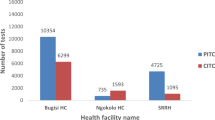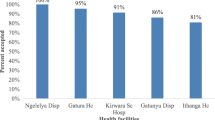Abstract
In Côte d’Ivoire, the Family Approach to Counseling and Testing (FACT) program began in 2015 and provides facility-based HIV testing to the sexual partners, children and other household family members of HIV-positive index cases. We evaluated whether the FACT program is an effective approach to HIV case finding. We reviewed 1762 index patient charts to evaluate outcomes of the FACT program, held across 36 facilities in Abidjan. Index cases enumerated a total of 644 partners, 2301 children and 508 other family members including parents and siblings. Among the partners tested for HIV, the positivity rate was 21%; for children the positivity rate was 5% and for all other family members the positivity rate was 11%. Offering HIV testing services to the family members of HIV positive index cases is an effective approach to case finding in Côte d’Ivoire. Particularly, offering HIV testing to the partners of positive women index cases can be key to identifying previously undiagnosed men and linking them to treatment.

Similar content being viewed by others
Notes
This data misclassification error may have been caused by confusion during the enumeration interviews where the parent or guardian of the minor index cases enumerated their other children. Further, data showed that all but one of these minor index cases were 11 years old or younger.
References
UNAIDS. UNAIDS Country factsheets Cote d'Ivoire, 20172017; (08/27/2018). https://www.unaids.org/en/regionscountries/countries/ctedivoire.
Quarterly MER indicator structured dataset. In: PEPFAR, editor. 2017–2018.
Leeper SC, Montague BT, Friedman JF, Flanigan TP. Lessons learned from family-centred models of treatment for children living with HIV: current approaches and future directions. J Intl AIDS Soc. 2010;13(Suppl 2):S3.
Grimsrud A, Bygrave H, Wilkinson L. The case for family-centered differentiated service delivery for HIV. JAIDS. 2018;78:S124–S127127.
Liambila W, Warren CE, Mullick S, Askew I, Homan R, Mohammed I, et al. Feasibility, acceptability, effect, and cost of integrating counseling and testing for HIV within family planning services in Kenya. Frontiers Final Report. Washington, DC: Population Council; 2008.
Betancourt TS, Abrams EJ, McBain R, Fawzi MC. Family-centred approaches to the prevention of mother to child transmission of HIV. J Intl AIDS Soc. 2010;13(Suppl 2):S2.
World Health Organization. Guidelines on HIV Self-Testing and Partner Notification: Supplement to Consolidated Guidelines on HIV Testing Services. Geneva, 2016.
Rosenberg NE, Mtande TK, Saidi F, Stanley C, Jere E, Paile L, et al. Recruiting male partners for couple HIV testing and counselling in Malawi's option B+ programme: an unblinded randomised controlled trial. Lancet HIV. 2015;2(11):e483–e491491.
Kahabuka C, Plotkin M, Christensen A, Brown C, Njozi M, Kisendi R, et al. Addressing the first 90: a highly effective partner notification approach reaches previously undiagnosed sexual partners in Tanzania. AIDS Behav. 2017;21(8):2551–600.
Brown LB, Miller WC, Kamanga G, Nyirenda N, Mmodzi P, Pettifor A, et al. HIV partner notification is effective and feasible in sub-Saharan Africa: opportunities for HIV treatment and prevention. J Acquir Immune Defic Syndr. 2011;56(5):437–42.
Henley C, Forgwei G, Welty T, Golden M, Adimora A, Shields R, et al. Scale-up and case-finding effectiveness of an HIV partner services program in Cameroon: an innovative HIV prevention intervention for developing countries. Sex Transm Dis. 2013;40(12):909–14.
Cherutich P, Golden MR, Wamuti B, Richardson BA, Asbjornsdottir KH, Otieno FA, et al. Assisted partner services for HIV in Kenya: a cluster randomised controlled trial. Lancet HIV. 2017;4(2):e74–e82.
Wagner AD, Mugo C, Njuguna IN, Maleche-Obimbo E, Sherr K, Inwani IW, et al. Implementation and operational research: active referral of children of HIV-positive adults reveals high prevalence of undiagnosed HIV. J Acquir Immune Defic Syndr. 2016;73(5):e83–e8989.
Kulzer JL, Penner JA, Marima R, Oyaro P, Oyanga AO, Shade SB, et al. Family model of HIV care and treatment: a retrospective study in Kenya. J Intl AIDS Soc. 2012;15(1):8.
Tonwe-Gold B, Ekouevi DK, Bosse CA, Toure S, Kone M, Becquet R, et al. Implementing family-focused HIV care and treatment: the first 2 years' experience of the mother-to-child transmission-plus program in Abidjan, Cote d'Ivoire. Tropical Med Int Health. 2009;14(2):204–12.
Ahmed S, Sabelli RA, Simon K, Rosenberg NE, Kavuta E, Harawa M, et al. Index case finding facilitates identification and linkage to care of children and young persons living with HIV/AIDS in Malawi. Tropical Med Int Health. 2017;22(8):1021–9.
Rutstein SE, Brown LB, Biddle AK, Wheeler SB, Kamanga G, Mmodzi P, et al. Cost-effectiveness of provider-based HIV partner notification in urban Malawi. Health Policy Plann. 2014;29(1):115–26.
Sharma M, Smith JA, Farquhar C, Ying R, Cherutich P, Golden M, et al. Assisted partner notification services are cost-effective for decreasing HIV burden in western Kenya. AIDS (London, England). 2018;32(2):233–41.
Programme National de Lutte contre le Sida (PNLS) Politique, normes et procédures des services de dépistage du VIH en Côte d'Ivoire 2016. https://www.pnls-ci.com/documentation/conseils-depistage/politiques-normes-procedures/normes-et-procedures-des-services-de-depistage-du-vih-en-cote-divoire-edition-2016/.
Lee ES, Forthofer RN. Applications in the social sciences: analyzing complex survey data. 2nd ed. Thousand Oaks: SAGE Publications; 2006.
Dalal S, Johnson C, Fonner V, Kennedy CE, Siegfried N, Figueroa C, et al. Reaching people with undiagnosed HIV infection through assisted partner notification. AIDS (London, England). 2017;31(17):2436–7.
ICAP. Preliminary Findings: Côte d’Ivoire Population-based HIV Impact Assessment (CIPHIA) 2018; (09/18/2018). https://phia.icap.columbia.edu/wp-content/uploads/2018/08/CIPHIA_Cote-DIvoire-SS_FINAL.pdf.
Newell ML, Brahmbhatt H, Ghys PD. Child mortality and HIV infection in Africa: a review. AIDS (London, England). 2004;18(Suppl 2):S27–34.
World Health Organization. Consolidated guidelines on HIV testing services for a changing epidemic. Geneva2019.
Kingbo MKA, Isaakidis P, Lasry A, Takarinda KC, Manzi M, Pringle J, et al. Partner notification approaches for sex partners and children of human immunodeficiency virus index cases in Côte d'Ivoire. Sex Transm Dis. 2020;47(7):450–7.
Acknowledgements
This project has been supported by the President’s Emergency Plan for AIDS Relief (PEPFAR) through the Centers for Disease Control and Prevention (CDC) under the terms of Cooperative Agreements 1U2GGH000385.
Author information
Authors and Affiliations
Corresponding author
Ethics declarations
Conflict of interest
The authors declare that they have no conflicts of interest.
Ethical Review
The FACT activity was carried out according to national policies and procedures on human subject protections, upheld by Côte d’Ivoire’s National Ethics and Research Committee (CNER) under the Ministry of Health and Public Hygiene. The analysis was approved by the Human Research Protection Coordinator of the Center for Global Health, Centers for Disease Control and Prevention (CDC).
Additional information
Publisher's Note
Springer Nature remains neutral with regard to jurisdictional claims in published maps and institutional affiliations.
Disclaimer: The findings and conclusions in this paper are those of the authors and do not necessarily represent the official position of the funding agencies.
Rights and permissions
About this article
Cite this article
Lasry, A., Danho, N.K., Hulland, E.N. et al. Outcome of HIV Testing Among Family Members of Index Cases Across 36 Facilities in Abidjan, Côte d’Ivoire. AIDS Behav 25, 554–561 (2021). https://doi.org/10.1007/s10461-020-03002-0
Published:
Issue Date:
DOI: https://doi.org/10.1007/s10461-020-03002-0




